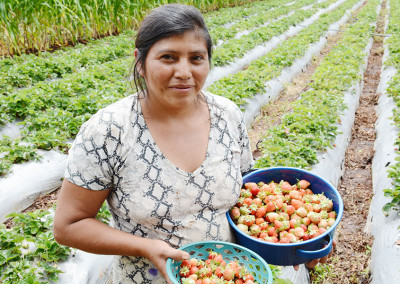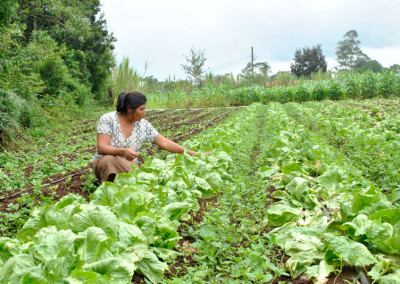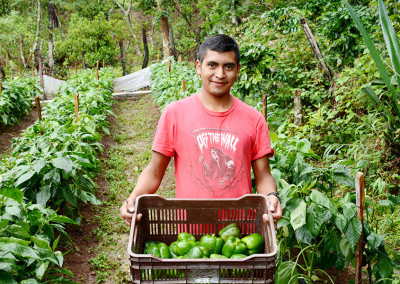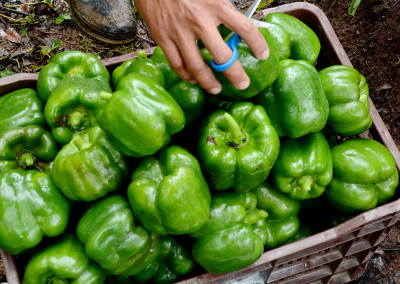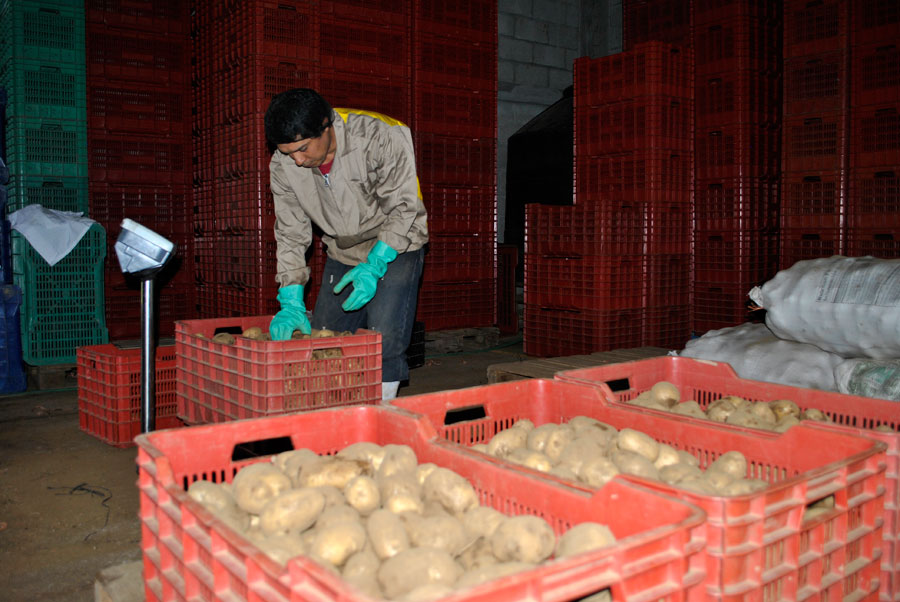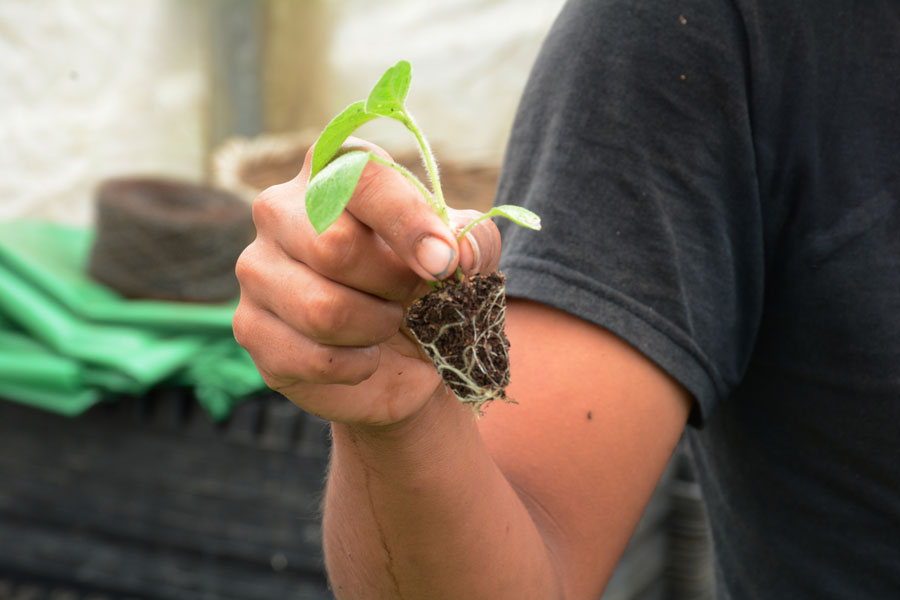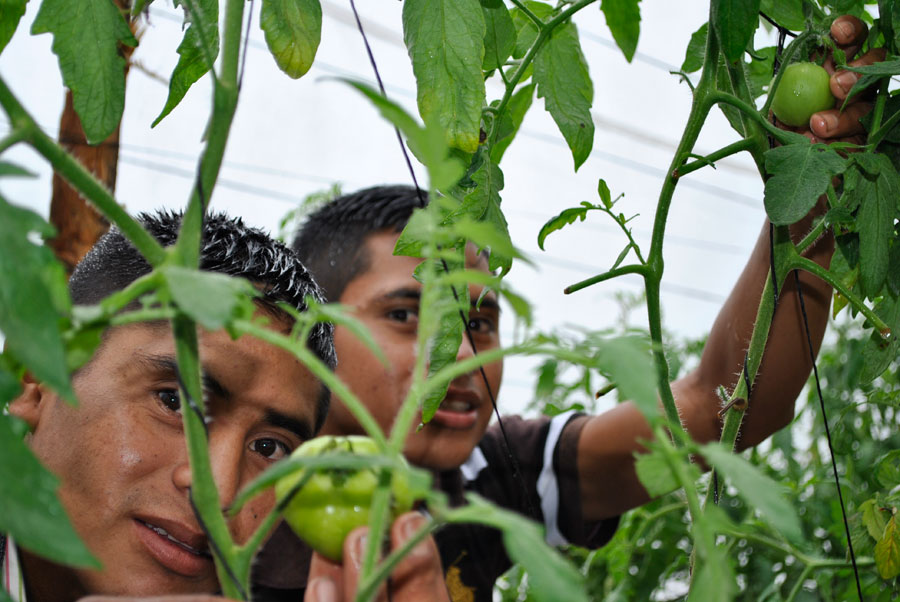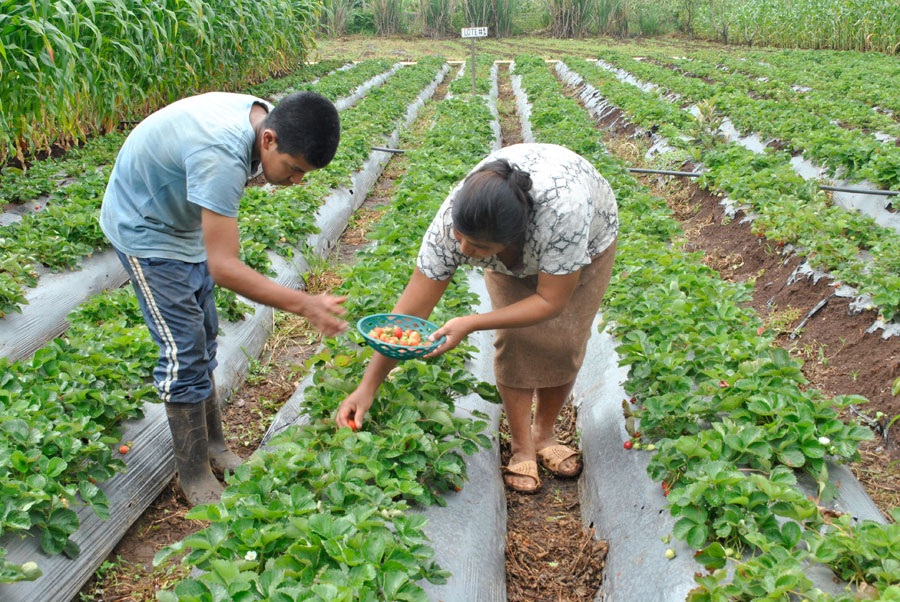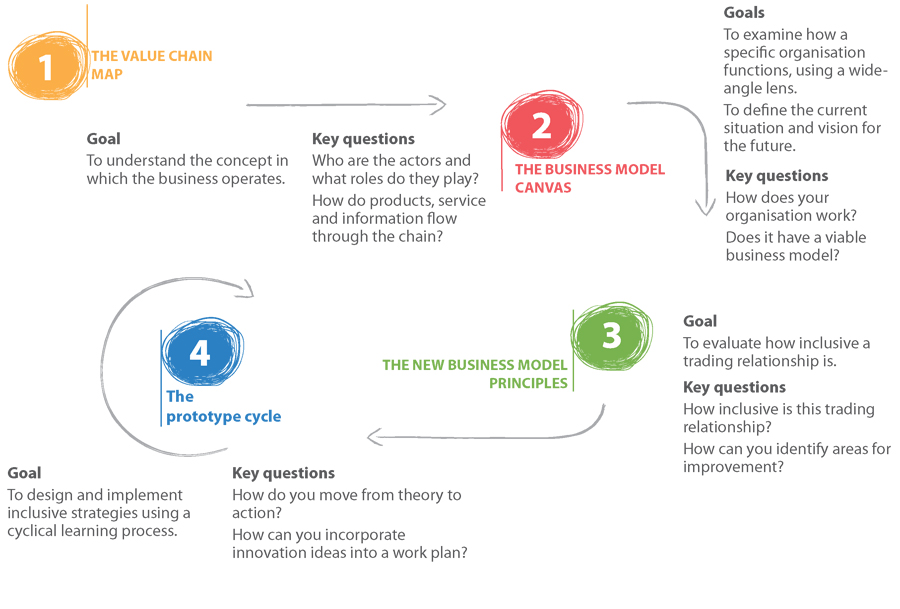A commitment to inclusion in Honduras
This has been his routine for more than 50 years. Along with his sons, he tills the fertile fields of Cofradía and El Duraznito, in Yamaranguila, far from the villages of the western department of Intibucá.
The farm is one of the 166 members of ASOFAIL [Association of Lenca Farming and Artisan Families from Intibucá], which started operating in 2010. The association features the participation of 46 women, most of them heads of household, and almost 30% of its members are under the age of 30.
Yamaranguila, department of Intibucá, Honduras
To become a member of ASOFAIL, certain requirements must be met: owning less than two hectares of farmland and strive to become the main character in his/her own development.
The Association’s first main goal was entering into a sales agreement with Walmart, one of the most important supermarket chains in Central America. They did this in 2011, hand in hand with VECO MA, the Vredeseilanden regional program in Mesoamerica.
Approximately 36 tons of vegetables a month, including beefsteak tomato, peppers, carrots, beets, and radishes, reach ASOFAIL’s collection center. Ninety-five percent (95%) are potatoes. Following a rigorous delivery, washing, and sorting process, the produce is ready to be taken to Walmart’s supply center in Tegucigalpa, sometimes San Pedro Sula, and from there to the 67 supermarkets supplied by the multinational.
“The problem with smallholder farmers is not being small, but being alone. ASOFAIL was created with the purpose of gathering smallholder producers from the area and link them to formal markets.”
Arlis ZepedaA set of tools
Although the business relationship between the smallholder producers, represented by ASOFAIL, and the giant retailer Walmart was going well, this business was missing an innovative methodological component that would allow farmers to have a secure market, and consumers to have a high-quality product on time. A true marketing agreement.
It was then that CIAT came on the scene in 2014, thanks to the Learning Alliance initiative and the LINK Methodology.
This participatory methodology aims at building inclusive business relationships that link a (formal or informal) group of producers with a buyer. It has been successfully tested in over 25 studies with small scale farmers in Colombia, Panama, Ecuador, Nicaragua, Honduras, Peru, and some African countries.
“Through the relationship between producer and buyer, methodologies have been applied in different contexts and moments to contribute to the development of producers, so they can be good business partners; to influence buyers, so they can be willing to change their business practices; and to facilitate an enabling environment for inclusive businesses.”
Jhon Jairo HurtadoASOFAIL members have taken on their leading roles in the value chain. On the one hand, directors of the Association took part in workshops and exchange activities with organizations from neighboring countries that work with the LINK Methodology, and then they and Walmart representatives sat down at the same table to discuss the business model they had agreed upon when the business relationship started. Farmers were also in line with participatory workshops held within their own farms.
The positive experience with Walmart enabled ASOFAIL to open a new line of business, applying the LINK Methodology. La Colonia supermarket chain became another powerful business partner. For a year, 16 tons of potatoes have been delivered monthly to the collection center of the chain, in Tegucigalpa.
In the final stretch
The second phase of the agreement between VECO MA and ASOFAIL is entering the final stretch. It has been five years of facilitation and financial support, two applying the LINK Methodology. During this time, mapping of the value chain has been achieved: to know the producers and their real needs in the field.
With weekly visits, the three ASOFAIL technicians reach the 166 members and provide them with advice on good agricultural practices, which have allowed them to cope with pests, diseases, and the impacts of a changing climate. Similarly, farmers receive advice on good manufacturing practices and to make sowing schedules to ensure a staggered harvest. The outcome has been an increase in production, up to 20% for some farmers.
“Work has also been carried out on three additional tools. The first one, how to represent the business models the organization has, that is, recognizing and differentiating the value proposition they have for the buyer and the one they offer their producers. The second one, to identify the principles for inclusive business relationships, that is, recognizing the level of inclusion of the business relationship, and third, to implement the prototype cycle that seeks continuous improvement of the business relationship.”
Jhon Jairo HurtadoMeanwhile, Walmart, the multinational company, has agreed to adjust its business practices to favor the smallholder producers from the Intibucá region with a stable and profitable business.
The agreement ends this year. It is necessary to work with ASOFAIL members to raise awareness on investing the income generated by the marketing of their horticultural products, covering topics such as improvement of their housing conditions and education of their children.
They know they can continue on their own and they are preparing to be self-sustainable. As Edmundo Hernández, President of the Board of Directors of ASOFAIL, rightly says: “NGOs withdraw, but they want to see results. We are the owners of our advancements. We can keep on producing and marketing with the large ones and make it a profitable business for everyone: a win-win situation.”
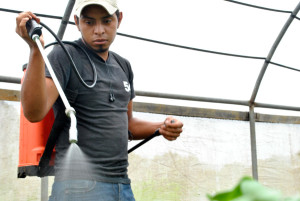 Denis Joel Rodríguez has dedicated five years of his life to the work in the field. He graduated from high school with a diploma in arts and sciences, and now his efforts are focused on university. He started growing potatoes, but pests would not let him move forward. Therefore, he decided to change crops. In less than a hectare of field – property of his father – he plants broccoli, romaine lettuce, and radishes; the latter to meet the needs of ASOFAIL and Walmart, its client.
Denis Joel Rodríguez has dedicated five years of his life to the work in the field. He graduated from high school with a diploma in arts and sciences, and now his efforts are focused on university. He started growing potatoes, but pests would not let him move forward. Therefore, he decided to change crops. In less than a hectare of field – property of his father – he plants broccoli, romaine lettuce, and radishes; the latter to meet the needs of ASOFAIL and Walmart, its client.
As an ASOFAIL member, he receives technical advice on every stage, ranging from seedlings to transplanting to crop management to harvest and marketing, in addition to loans free of interests and late payment fees. He pays with his production.
Denis knows about the LINK Methodology. He assures that thanks to it, he has become acquainted with good agricultural practices that make his vegetables a one hundred percent quality produce. This feature ensures him a market and a good price throughout the year. He hopes he will have a long-term relationship with his client, just as the scope of the LINK Methodology, and that he might keep on having a steady income so he can afford his university tuition and be the agricultural engineer who grows crops in his own field.
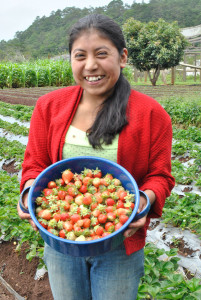 Half a manzana (0.7 hectares) has been an area large enough for Lourdes Vásquez and her husband to raise their children. Each season, their farm, strategically split, produces 700-750 kg of carrots, strawberries, lettuce, and maize. Carrots go straight to the ASOFAIL collection center, the rest they sell on the informal market.
Half a manzana (0.7 hectares) has been an area large enough for Lourdes Vásquez and her husband to raise their children. Each season, their farm, strategically split, produces 700-750 kg of carrots, strawberries, lettuce, and maize. Carrots go straight to the ASOFAIL collection center, the rest they sell on the informal market.
Lourdes would like her leafy lettuces to also reach Walmart and thus have secure a market. They comply with all the requirements the chain demands, but her illusions fall by the wayside. ASOFAIL has not implemented yet the cold chain that would allow the lettuce plants to reach the multinational’s collection center on time. Arlis Zepeda, Manager of ASOFAIL, assures this is another great challenge the association faces.
“We want to guarantee that the temperature of our products is controlled all the way from the moment it comes out of the ground, during transport, storage, until it is delivered to the buyer. We could thus include other products in our trading with Walmart and be open to negotiations with other supermarkets that would want to work with us”, says Arlis.
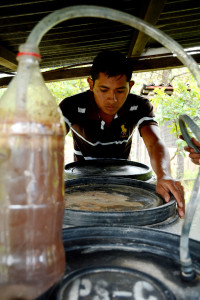 With theory and practice. This is how 60 members of ASOFAIL are preparing to be certified for good agricultural practices related to food safety by the National Agricultural Health Service (SENASA, for its Spanish initials), an entity of the Secretariat for Agriculture and Livestock of Honduras. Thirteen (13) farms are already waiting for the visit of the inspection body.
With theory and practice. This is how 60 members of ASOFAIL are preparing to be certified for good agricultural practices related to food safety by the National Agricultural Health Service (SENASA, for its Spanish initials), an entity of the Secretariat for Agriculture and Livestock of Honduras. Thirteen (13) farms are already waiting for the visit of the inspection body.
Manuel and Carlos Hernández, Heriberto’s children, want to be among the first members of ASOFAIL to pass the test. The hopes of these young men and their five friends, all of whom produce organic fertilizer, are placed in three plastic baskets.
Microorganisms from the mountain, oak leaves with fungi, water, molasses, and a 30-day fermentation, that is the formula. The trial is conducted on 250 banana plants.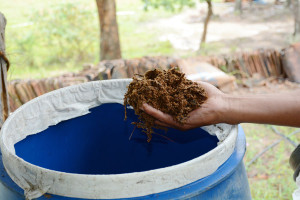
“With chemicals only the plant is nourished, with this fertilizer we are nourishing the soil as well. We want to produce food free of chemicals; in addition to protecting the environment, we would be reducing production costs and we know there is a market for this kind of products”, says Manuel.
Reducing the use of chemicals (if strictly necessary, the use of products with blue or green label is advised), their placement in storage rooms, labeled plots, barriers to prevent the movement of animals, and the elimination of latrines are some of the aspects ASOFAIL is working on with its farmers to obtain the certification for good agricultural practices and, thus, keep on conquering other markets.
This is an initiative promoted by CIAT since 2003, with the aim of encouraging collaborative work among international NGOs, research organizations, and development organizations, so that knowledge exchange among them through joint initiatives can contribute to the design of more effective development strategies, more appropriate policies and research processes that better respond to the demands of the rural sector. Today, this work is supported by the CGIAR Research Program on Policies, Institutions and Markets (PIM), led by the International Food Policy Research Institute (IFPRI).
In Honduras, this initiative was launched in 2012. It is coordinated by Swisscontact and supported by the Tropical Agricultural Research and High Education Center (CATIE), Catholic Relief Services (CRS), Heifer, Foundation for Rural Business Development (FUNDER), Lutheran World Relief, OXFAM, VECO Mesoamerica, COMRURAL and SEDUCA (SAG) projects, and PRONAGRO (SAG) and EMPRENDESUR programs.
A step by step guide to LINK
In Honduras, members of the Asociación de Familias Agropecuarias Artesanales Intibucanas Lencas, ASOFAIL [Association of Lenca Farming and Artisan Families from Intibucá], strive to become the main characters in their own development. With the support of VECO MA and following the LINK Methodology promoted by CIAT, they have been able to strengthen the marketing agreement with Walmart, the multinational company, and to reach more markets with La Colonia supermarket chain. A successful experience that has facilitated their progress from a traditional to a more inclusive business relationship.
Authors of this post:

Adriana Varón
Communications Coordinator for Latin America
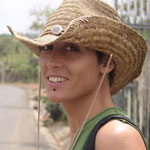
Stéfanie Neno
Communications Manager

